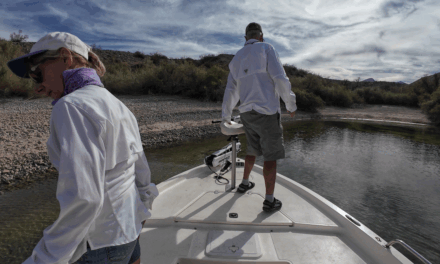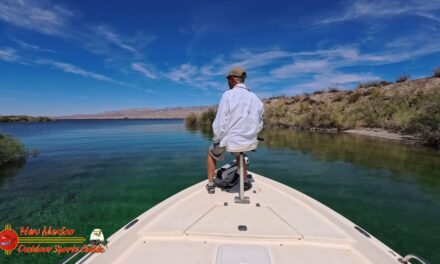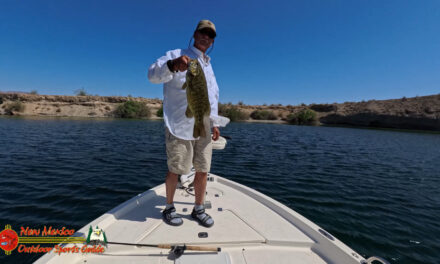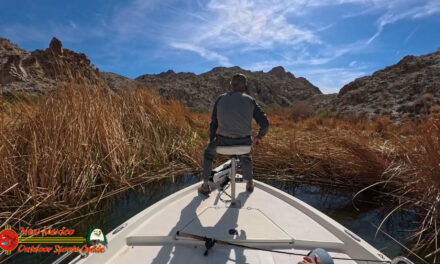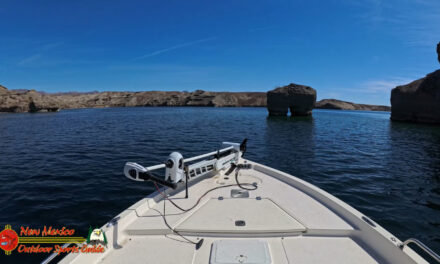Choosing the Right Saltwater Guide – Lake Mohave
Whether you want to learn about a new bay or you just love to fish and don’t want the hassles associated with owning a boat, fishing with a professional guide can be both a pleasant and rewarding experience.
There are many things to consider when trying to find that one guide that will meet all your needs. And since you could be on the way to building a long relationship, you should go about your search just as you would when looking for a family doctor or mechanic.
Ask your friends, talk to the different guides at the trade shows, and see who’s getting all the press in local papers and magazines.
Once you’ve narrowed your search down to a few guides, that look like they’re what you want, the real work begins.
I spoke with several well known, and respected, guides from the Rockport and Galveston areas to find out what they do to keep customers coming back time after time. And, having fished with a couple of them myself, I made a few judgements that might be of interest.
One thing to keep in mind is personality and what you want out of your guide. Catching a lot of fish is one thing, but there is more to fishing than just the catching.
Capt. Jay Watkins a guide done RockPort way says that he tries to look at every trip as new. “I try to get all my clients to enjoy the whole fishing experience, he says, and by that I mean that the hoped for end result is catching fish, but the being on the water and enjoying the surroundings, the birds, and just being outside for a day is all part of the whole thing.” According to Jay, and I happen to agree, the actual catching is just the icing on what would be an already good day.
Since many of us may only do one or two types of fishing, equipment is another factor to consider when choosing a guide. Does he or she supply everything needed for a days fishing or are there items you, the client, must bring along.
“I have everything my customers could possibly need”, says Galveston guide Capt Pat Murray. “Most of the people who fish with me prefer to use their own rods and reels, Murray continues, but if someone doesn’t have the proper equipment for bay fishing, I keep extra rods and reels on the boat for them to use.” Murray also says that he has the lures that are working best at the time, but that the same applies here as with other equipment. “If someone has a particular lure that they are comfortable using, I’ll try to persuade them to use what has been producing most recently and I’ll have them on the boat. The only thing most guides don’t supply is food and drink.”
Just as fishermen are all different, you’ll find guides who fish with bait and guides who predominately use lures. Both Pat and Jay would prefer to use artificials, but if the customer wants to use live bait I’m sure they’ll go along.
There are a few other things that you should know before showing up at the boat ramp for your trip.
If the good old days, guides supplied everything you’d need, rods & reels, lures, waders, leg guards, and everything but the kitchen sink. Then prices for all this equipment went out of sight and it became cost prohibitive for the guides.
The best thing about hiring a professional guide is having someone at your disposal, for an entire day, that knows as much about the area and patterns of fish as you could possibly want to learn. “Most people don’t take advantage of the knowledge that a guide has spent a lot of years gathering, says Galveston guide Capt. Tim Young, and that’s one reason to hire a guide, so that you can learn some of what they know without having to spend years of trial and error running around the bay using up gas and time.”
No matter what you want a guide for, it helps to know what they can teach you or more importantly what you can learn from them. I know that without guides, it would have taken a lot longer for some of us to gain the knowledge we have today.
As I mentioned earlier there are some things that a guide will provide and others that he won’t.
If you plan to wade, take along a good pair of waders, wading belt equipped with hook remover, stringer, and lure pouch (Some guides will supply the belt and accessories). If you feel like you aren’t ready to be hand grabbing 27 inch redfish, you may also want to carry a short-handled dip net.
Personal rain gear is another item that the fisherman is usually responsible for taking on the trip. (If it looks like rain that is). And even if there’s no rain in the forecast, your rain jacket can double as a wader jacket.
The best thing is to check with your guide and find out what type of fishing you’ll be doing and what gear you need to bring. – Lake Mohave


